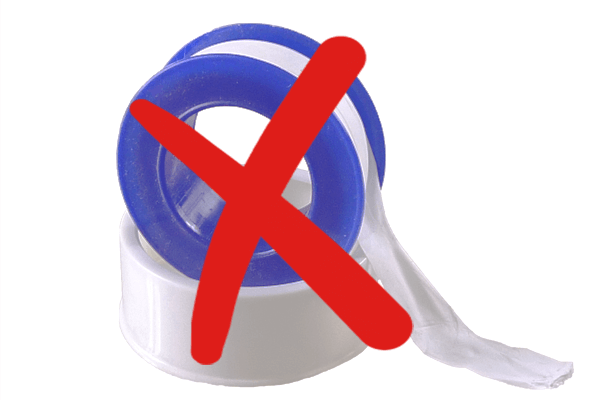Teflon tape was one of those fantastic new items introduced in the early 1970s. This is an easy yet very versatile lubricant and thread sealer, often known as PTFE tape. Teflon tape is used chiefly to minimize leaks when joining metal pipes along sewage or fuel lines.
So, the point is, do you know when not to use Teflon tape and when to? This is an essential consideration if you intend to use Teflon tape for a DIY project since Teflon tape can create leaks if misapplied. For example, alternative bonding procedures are used if you’re dealing with PVC, copper, or PEX pipes, and Teflon tape isn’t required.

Contents
What exactly is Teflon tape or PTFE tape?
Teflon Tape is a common, cheap, and effective thin white tape often seals pipe threads when plumbing works are completed. It’s generally available in various sizes, ranging from little rolls to massive spools, at your local hardware shop. Plumber’s tape is frequently packaged in a plastic container to protect the adhesive.
It has a silky feel and splits in a stringy manner. It is officially known as PTFE (polytetrafluoroethylene). Because the tape is waxy, it is typically utilized in plumbing and electronics. You may also use it to repair coils, insulation, and threads.
When used as a lubricant, PTFE has minimal friction, wear, and energy consumption of equipment; Teflon® tape has various applications. Teflon® tape, in particular, is intended to cover the threads of plumbing components and produce a tighter seal.
Because of the strength of the carbon-fluorine bonds, it is extremely non-reactive. As a result, it is frequently utilized in containers and pipes for corrosive and reactive chemicals. You will have good craftsmanship if you use Teflon® tape on any plumbing repairs that require threaded pipes.
When not to use Teflon tape?
Teflon®, a Dupont brand name for polytetrafluoroethylene (PTFE), is utilized as a nonstick covering for cookware, pans, and even industrial food processing machines. A recent tenacious coating leak from a client revealed why we oppose the use of Teflon tape onto fluid connections.
There are two kinds of threads in the wet coating business: NPS (National Pipe Straight) and NPT (National Pipe Tapered). The tapered NPT thread is utilized on air connections and the straight NPS thread on liquid links in the damp coating sector.
The NPT thread arrangement on the air fittings creates a seal between the females and males tapered threads. Simultaneously, the NPS design incorporates an internal seal within the female swivel fitting and a tapering seat of the same angle on the interior of the male connection.
A smooth metal-to-metal contact, like in the NPS internal design, is a good pressure seal design. We observe field connections where Teflon tape has been thrown onto NPS fluid connectors. In recent examples, the tape was so thick that the females and males tapered sealing layers were not internally joined, resulting in a leak.
Similarly, you should not use PTFE tape when attaching PVC fittings or valves with female (FPT) threads. A wedging motion might occur when using the tape on female connections, causing substantial stress on the joints during installation.
Where to use Teflon or PTFE tape?
Many varieties of PTFE tape, often known as thread sealants, can reduce leakage around specific types of connections. Tape thicknesses can be used to offer an extra barrier against ducting leakage.
These tapes frequently contain naturally expanding characteristics. And it fills any minor gaps between conduits and threads once covered around the interior of the connection of a thread.
Teflon tape for Petrol and Oil
PTFE tape is resistant to both fuel and oil due to its chemical inertness. As a result, you can frequently seal using it and lubricate fuel line connections in automobile applications.
The plumber’s lubricant and sealant tape is made to withstand relatively high pressure and heat. This implies that it is generally appropriate for use in situations where oil, gasoline, diesel, and other fuels may be present.
Teflon tape for Gasoline
PTFE tape is commonly used for sealing gas pipes, but choosing the correct item for your task is critical. Gas-rated PTFE thread seal tapes are denser and thicker than ordinary PTFE tape used in liquid pipes settings. Because it is more porous, the latter is more prone to deterioration and leakage if used for gas pipes. This is often thinner at the production process time than the heavier PTFE tapes used for regular gas ducting connections.
Teflon tape for Leak Sealing
Stopping leaks using plumber tape is a common technique. When coupling joints together, it is usually employed as a preventive precaution.
Moreover, it covers the male component threads with Teflon tape just before mating may seal and tighten the connection inside. This adds another layer of defense against potential leaks.
Teflon tapes are also used as a short-term fix to help seal plumbing leaks until you can do more work. It is often placed to the outside of a joint to prevent additional leakage. However, it is not a long-term solution for repairing deteriorated, broken, or improperly fitting joints.
Teflon Tape Alternatives
While thread seal tapes are a beautiful tool in most circumstances, there are a few instances where it is not the best tool for the task. Water dribbles through some pipes due to their large threads. In some cases, the pipe will not allow you enough area to apply the tape correctly, creating the opposite situation.
To get the job done in instances like these, you’ll need to seek acceptable alternatives to thread seal tapes.
Teflon valve Packing
You can use a valve packaging of Teflon for gasket or bushing. It’s a material that’s utilized in place of O-rings.
It is also excellent for use in linkage with significant gaps. It’s also appropriate for usage in links that have a ridge.
Dope Pipe
Pipe dope, also popular as a pipe connection sealant/compound, is a liquid that seals threads such as tape. The container includes a top with a swab brush attached.
Because it is a liquid, pipe dope works by filling the gaps within the connection. It can seal more extensive fractures than tape. It does not take up as much room as tape.
Pipe Thread Sealant Made of PTFE
PTFE is a thread sealant. It has Teflon as one of its ingredients. In PTFE, Teflon acts as a lubricant. PTFE, on the other hand, seals threads like pipe dope.
Despite being subjected to severe pressure, temperature, and chemicals, it maintains a tight seal. It has the same function as Teflon tape as a thread sealer. Applying pipe dope on top of PTFE creates a better seal.
Final Verdict
We hope you found your answer and learned a lot about “when not to use Teflon tape.” In this article, we’ve also provided the most acceptable alternatives for you!
Overall, if you’re looking for the most excellent plumber’s tape substitute, pipe dope is the way to go.
Whatever choice you select, be sure you understand what you’re doing. If it’s a big task or something important for your house or property, get professional guidance. DIY is enjoyable, but it may be pricey in the long run if you make an accidental mistake.
